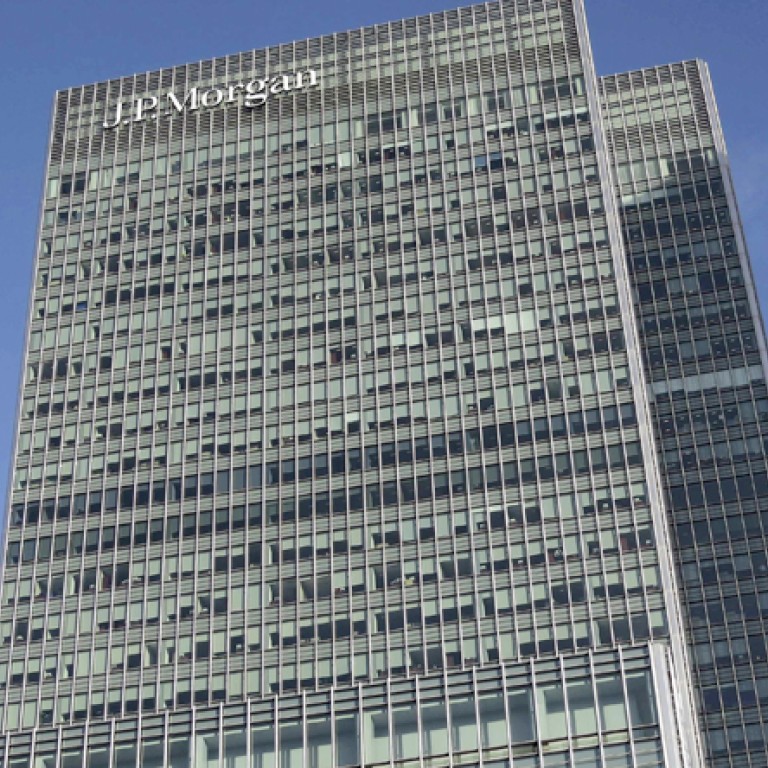
JPMorgan effect casts chill over firms' hiring practices in China
Demand for offspring of influential mainlanders takes a fall amid controversy over employment
Western financial institutions and Chinese firms have become more cautious about employing potentially influential mainlanders in the wake of publicity over JP Morgan's repeated hiring of well-connected Chinese.
"I know for a fact that my clients are being cautious. This includes Chinese corporates and Western financial institutions," said Basil Hwang, a Hong Kong-based partner at Zhong Lun, a mainland law firm.
"Virtually every global financial institution and multinational, whether Western or Chinese, is careful today of any perception that they are granting favours in return for business.
"Both the US and UK are very sensitive of any company doing favours for anyone. There is increasing sensitivity among Chinese authorities towards corruption."
JP Morgan, the biggest US bank by assets, recently stopped work on the Hong Kong listing of Tianhe Chemicals shortly after Joyce Wei, a daughter of the mainland firm's chairman, left the bank for a job at UBS, the reported on January 22.
Tianhe was the second initial public offering JP Morgan dropped in quick succession, having withdrawn in November from China Everbright Bank's offering in Hong Kong.
The Wall Street bank at one point hired Tang Xiaoning, the son of China Everbright Group chairman Tang Shuangning.
JP Morgan has been caught up in US regulatory probes into its business practices, including its hiring practices in China.
Nearly all the top eight investment banks - JP Morgan, Goldman Sachs, Citicorp, Morgan Stanley, UBS, Credit Suisse, Deutsche Bank and Bank of America Merrill Lynch - are under investigation by US authorities in regard to whether they have inappropriately hired well-connected Chinese, said Gene Buttrill, a partner with US law firm Jones Day.
Virtually all the major Western banks are dismantling or carefully reviewing such hiring programmes, said Buttrill.
When asked about employing well-connected Chinese, a Citi spokesman replied: "Citi has well-established global procedures on hiring, where we ensure that any candidate for any position is assessed on their relative merits. This includes strict legal and compliance guidelines on hiring."
A banking source who declined to be named said Citi had made a conscientious decision to build a China investment banking team based on people with industry expertise rather than "princelings" - offspring of influential mainlanders.
A UBS spokesman said: "UBS appoints on merit and recruits from a wide range of sources, which include candidates with a track record in finance."
The underlying principle behind the US regulators' investigation of US companies hiring well-connected Chinese is prevention of abuse of power, said Julian Russell, director of Pacific Risk, a Hong Kong risk consultancy.
"Note there is no evidence that power has been abused in the JP Morgan transactions," Russell said. "However, the perception of abuse of power can be as damaging as genuine abuse of power, because of the lack of transparency, which prohibits others from observing how decisions are made.
"There is nothing wrong in employing well-connected people; in fact, this is absolutely necessary to do business anywhere in the world. However, the risk of abuse of power needs to be minimised by providing a sufficient level of transparency."
Keith Williamson, head of global forensic and dispute services in Hong Kong and China at Alvarez & Marsal, an international professional services firm, said to avoid potential problems, companies should ensure job applicants disclose their relationships with government officials as well as current and prospective customers of the hiring firm.
JP Morgan declined to comment. Bank of China, Credit Suisse, Goldman Sachs and Morgan Stanley did not reply to questions from the .

